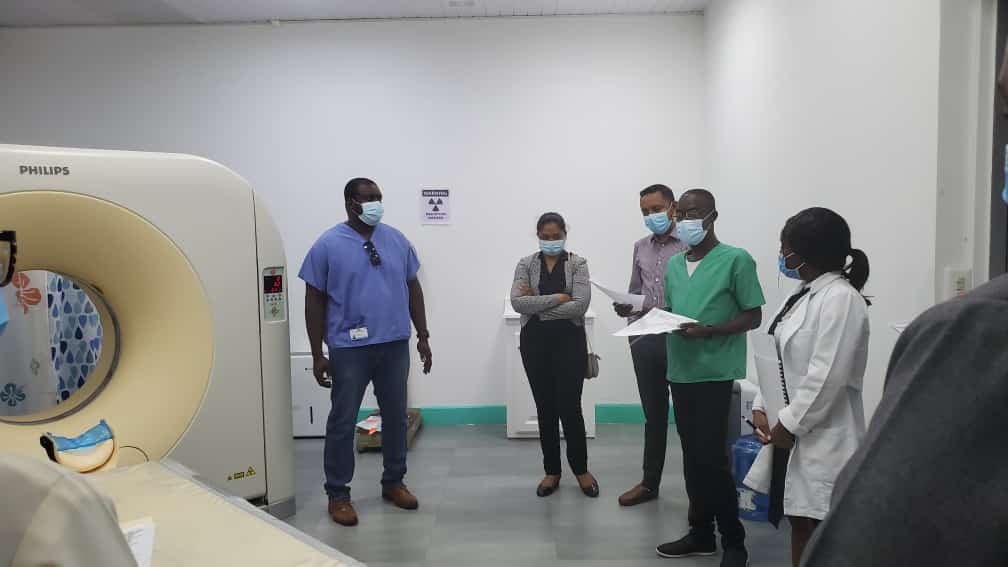
Doctor returns with cutting edge skills after completing diagnostic radiology fellowship
By Lazeena Yearwood
Dr. Joel Joseph, who underwent a fellowship programme with Dalhousie University in Canada, recently returned with cutting edge skills to transform the vascular and interventional radiology services offered locally.
Dr. Joseph, 34, spent 13 months in Canada where he received training to perform minimally invasive procedures that are needed for treating diseases.
The doctor is attached at the Georgetown Public Hospital Incorporation (GPHC), where prior to his return, these procedures had to be done by foreign doctors during visits at the hospital.
During an interview with News Room on Wednesday, Dr. Joseph said he realised the need to improve diagnosis and treatment for diseases, hence he pursued the fellowship to become the first vascular and interventional radiologist in Guyana.

“Radiology is one of the specialties that is really a determinant of health and really the determining factor in survival in developed countries and its one of the things that we don’t have access to in developing countries.
“As a medical student I realised that radiology was one of the less developed parts of the healthcare sector and I wanted to be a part of the making a difference,” Dr. Joseph said.
The concept behind interventional radiology is to diagnose and treat patients using the least invasive techniques currently available, to minimize risk to the patient and improve health outcomes.
He added that when he first realised his interest in the specialty was just after medical school and when a relative needed the service and it became clear that radiology is “the missing link in really treating people that are at the end of the spectrum that are very sick.”
Dr. Joseph embarked on an internship at the hospital soon after receiving education at the University of Guyana’s medical school. There he worked in the department of vascular surgery and nephrology for two years.
However, he wanted to make significant strides at the hospital. As such, he started reaching out to universities abroad and eventually, Dalhousie’s fellowship programme became an option. Given the opportunity to not only build individual capacity, but also that of the hospital, a collaborated effort in the form of support was formed between the Ministry of Health, the hospital and RiteAid to sponsor him.
Just after starting the fellowship, he realised how under-developed the department in Guyana is.
“There (in Canada) it’s really a different world. People have tumors in their liver, spread from their breast cancer or the other cancers and we (Canada) treat them and they get better—that’s almost a death sentence here (in Guyana),” Dr. Joseph said.

He also noted that he experienced a culture shock at the level of expertise that they expected at a Fellowship level. He said it was a difficult transition from a country where the tools aren’t readily available for practice but he had to make the adjustment.
The doctor is optimistic that the team in the Radiology department will be able to better facilitate patients now.
He returned home in May and already, the hospital is working with him to develop the department and its supply chain to provide the capacity of service that is similar to developed countries.
Dr. Joseph explained that he was trained to use special instruments used in procedures that otherwise weren’t done or used alternative treatments such as highly invasive surgeries.
The Director of Medical Services at the hospital, Dr. Navin Rambarran, said this is a great addition for the hospital and it’s services.
“It’s very exciting to have such a skilled staff, someone trained in interventional radiology; what it does effectively for our surgical departments [and] in all departments is that a lot of the things that we would have always had to do surgically, [like] open the body or a limb, we can now do in a endovascular or a, a minimally invasive percutaneous way.

“If there is a collection of pus in cavity such as the abdomen, or the chest, we can do a percutaneous needle guided prostate takedown – that’s one of the simplest procedures to do when we have bleeding, for example, in trauma, persons with accidents and gunshots and so on.
“The endovascular work or skill can actually help to stop bleeding, sometimes not requiring an operation after that is done in maternal healthcare,” he explained.
Dr. Rambarran also said that the hospital encourages its staff to study and better equip themselves so that the institution can operate at maximum capacity for saving lives.
He said the hospital is constantly expanding its services to keep up with international health standards.
Currently, the hospital has a well established relationship with several other foreign hospitals and healthcare organisations including Northwell Health in New York, Operation Walk and the United States Southern Command Lesser Antilles Medical Assistance Team (LAMAT).




